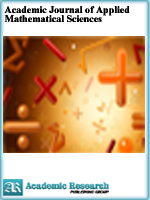Academic Journal of Applied Mathematical Sciences
Online ISSN: 2415-2188
Print ISSN: 2415-5225
Print ISSN: 2415-5225
Quarterly Published (4 Issues Per Year)

Archives
Volume 5 Number 8 August 2019
Definition of Derivative Function: Logical Error in Mathematics
Authors: Temur Z. Kalanov
Pages: 124-129
DOI: doi.org/10.32861/ajams.58.124.129
Abstract
The critical analysis of the foundations of the differential calculus is proposed. Methodological basis of the analysis is the unity of formal logic and of rational dialectics. It is shown that differential calculus is fictitious mathematical theory because the concept of the limiting process is the starting point for definition of the derivative function. The passage to the limit “zero” in the definition of the derivative function signifies that the variable quantity takes the only essential value “zero”. This fact leads to the following errors. (1) The definition of the derivative function is based on the violation of the necessary and sufficient condition for the validity of the relationship between the increment of the function argument and the increment of the function because the increment of the function is divided by the zero increment of the argument in the case of the limiting process. (2) The definition of the derivative function is based on the contradiction which is that the increment of the argument is both zero and not zero in the same relationship. This contradiction represents a violation of the formal-logical law of identity and of the formal-logical law of the lack of contradiction. (3) The definition of the differential of function is based on two contradictory (mutually exclusive) features: the differential of the argument is not zero while the increment of the argument in the definition of the derivative function is zero.
Self-regulation in Mathematics Courses for Engineering Based on Study and Research Paths
Authors: Echavarría Cepeda Lenin Augusto ; Díaz Barron Luis Rey ; Hernández Vargas Yazpik
Pages: 114-123
DOI: doi.org/10.32861/ajams.58.114.123
Abstract
Several studies have shown that there is a positive correlation between self-regulation and the academic performance of students. Self-regulated learning is the set of processes that the learners deploy to achieve their personal goals and that have to do with the learning strategies they use, with the answers they offer when evaluating the effectiveness of learning and with the motivations they have. To this end, the Study and Research Paths (SRPs) strategy is proposed to encourage better self-regulation processes in the students of the Unidad Profesional Interdisciplinaria de Ingeniería Campus Guanajuato (UPIIG) of the Instituto Politécnico Nacional (IPN). This strategy was proposed by Yves Chevallard within the framework of the Anthropological Theory of the Didactic and the World Questioning Paradigm. Students of the courses of Numerical Methods and Numerical Analysis of the academic programs of engineering in: Aeronautics, Automotive Systems, Biotechnology and Pharmaceutical formed the study group. This research work presents the analysis of the results of the initial phase of the measurement of the evolution of the self-regulatory processes that students use in the development of engineering projects that need the application of numerical methods for the analysis of situations, the decision making and the development of new products.



